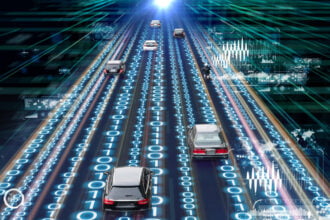Deep learning tech is influencing and enhancing many industries, promising to provide insights into key business operations which were not previously possible to unearth. Transportation and logistics is a prime example.
The transportation analytics industry is projected to be worth $27 billion by 2026. One of the biggest applications of this technology lies with using deep learning to streamline fleet management.
Fleet management is one area that is especially well positioned to benefit from the latest data-driven analytical tools, so here is a look at just how much positive disruption is being caused in this market at the moment.
Improvements to efficiency & sustainability
Businesses which operate fleets of vehicles, whether small or large, are under increased scrutiny with regards to the sustainability of their operations at the moment.
There are a number of ways to go about improving the eco-friendliness of business fleets, with the long term aim of many organizations being to migrate to fully electric vehicles, leaving fossil fuel powered incumbents in the past where they belong.
The problem with this is that ditching diesel-powered fleets to upgrade to EVs is expensive and often impractical in the short to medium term, which is where modern fleet management solutions with deep learning capabilities come into play.
Since it is possible to retrofit existing fleets with the GPS tracking and monitoring devices necessary to track everything from distance travelled to time spent idling, businesses can affordably tap into a wealth of data points, extrapolating actionable findings that can show where improvements to sustainability are achievable today, not tomorrow.
Route adjustments made in real time
Following on from the improved efficiency which is available through fairly basic vehicle monitoring and number-crunching, deep learning systems combined with fleet management software can also be put to work to solve the most common transport conundrum in history; congestion.
Systems can use a combination of GPS tracking in vehicles and access to traffic updates to determine the best route in real time, making changes as conditions shift from minute to minute, and ensuring that drivers are not unnecessarily held up by jams that could be avoided.
Rather than requiring a large team to constantly be monitoring and relaying this kind of information to drivers, or undergoing extensive analysis of routes to try and identify trouble spots and places where time savings could be made, deep learning takes all of this and automates it, giving fleet operators the insights they need in less time.
Maintenance issues avoided entirely
The measuring of various performance metrics within fleets can also extend to maintenance matters. Vehicles which suffer faults outside of scheduled periods of maintenance can create added costs for business and compromise customer satisfaction levels, as well as potentially putting drivers at risk.
Conversely, if deep learning is applied to information fed in from tens, hundreds or thousands of vehicles, the software can create maintenance models which give businesses a clearer picture of overall vehicle health, as well as an opportunity to carry out repairs at predetermined points which match real world driving conditions, not the claims made by manufacturers.
Once again it all comes down to giving decision-makers the power to come to informed conclusions about the factors impacting fleet productivity and overarching costs, without needing to invest vast amounts of time, money and resources into manually reaching these decisions.
Unpacking drivers’ bad habits
There are so many aspects of the way people drive vehicles that determine their overall performance behind the wheel, from the perspective of efficiency, productivity and of course safety.
In the past, businesses were unable to delve into the data on driver behavior in any meaningful way, other than tracking things like fuel costs and incident reports. However, deep learning is ushering in an era in which far more information can be gathered, while also being processable in real time, so that bad habits can be singled out and suggestions for changes provided on the fly.
As well as addressing all of the aforementioned issues, this has the added benefit of depersonalizing the process of training and coaching professional driving, taking the emotion out of recommending changes to habits so that they are more likely to comply.
In the long term, deep learning will bring about the age of fully autonomous business fleets, but until that happens on a large scale, it will remain crucial to making current fleet operations as effective and impactful as possible.










